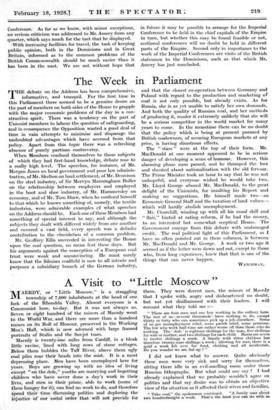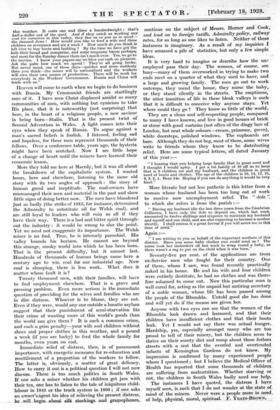A Visit to "Little Moscow " M AERDY, or " Little
Moscow," is a straggling township of 7,000 inhabitants at the head of one fork of the Rhondda Valley. Almost everyone is a Communist here, to-day. But it was not always so. $even or eight hundred of the miners of Maerdy went to the World War, and there are more than a hundred harries on its Roll of Honour, preserved in the Working Men's Hall, which is now adorned with large framed portraits of Stalin and the Sovjet tsars. Maerdy is twenty4me miles from Cardiff, in a bleak little ravine, lined with long rows of stone cottages. Below them bubbles the Taff River, above them ugly Coal piles rear their heads' into the mist. It is a most depressing place. Men have been unemployed here for years. Boys are growing up with' no idea of living except "on the dole," youths are marrying and begetting Children who have never done a day's work in their fifes, and men in their prime, able work (some Of lfiem hungry for it), can find no work to do, and therefore Spend their time discussing 'politics and deploring the injustice of' our social Order that will not provide fOr them. They were decent men, the miners of Maerdy that I spoke with, angry and disheartened no doubt, but not yet disillusioned with their leaders. I will recount what they told me :- "There are four men and one boy working in the colliery here. The rest of us—several thousands—have nothing to do, except thirty or forty who can sometimes pick up a job elsewhere. Some of us get unemployment relief, some parish relief, some pensions. The few who work half-time are rather worse off than those who do nothing. The' dole ' is eighteen shillings for the man, five shillings for wife or mother, and two shillings for each child. Rents are seven to twelve shillings a week. A family with three children has therefore twenty-nine shillings a week ; allowing for rent, there is a quid a week left over for food, clothing and all incidentals. Do you wonder we are fed up ? "
I did not know what to answer. Quite obviously these men were very sick and sorry for themselves, sitting there idle in an evil-smelling room under those Russian lithographs: But what could one say ? I had already explained that we probably wouldn't agree on politics and that my desire was to obtain an objective view of the situation as it affected their wives and families.
" Take coal," the spokesman continued. "A family uses about two hundredweight a week. That's the least you can do with in
this weather. It costs one and three a hundredweight : that's half-a-dollar out of the quid. And if they catch us working any
coal for ourselves in this valley, they fine us or put us in quod- the damned Jews 1 How would you like to feed a wife and three children on seventeen and six a week ? How much do you think is left over to buy boots and bedding ? By the time we have got the kids their bread and margarine, and some tenpenny bacon perhaps, and meat for the Sunday dinner there isn't much over. Yes, we go to the movies. I know your papers say we blow our cash on pleasure. Ask the pubs how much we spend ! They're all going broke. But never mind, one of these days—quicker and more suddenly than you think—the mines will be nationalized and the workers will own their own means of production. There will be work for everybody in the Workers' Government. Russia and China will trade with us."
Heaven will come to earth when we begin to do business with Russia. My Communist friends are startlingly sure of it. I have seen Christ displaced amidst so many communities of men, with nothing but cynicism to take His place, that it is noteworthy (not surprising), that here, in the heart of a religious people, a new saviour is being born—Stalin. That is the present twist of Second Adventism in Wales. A light comes into their eyes when they speak of Russia. To argue against a man's sacred beliefs is foolish. I listened, feeling sad and hopeless, for these men represent thousands of their fellows. Over a conference table, years ago, the hysteria might have been scotched. Now I see little hope of a change of heart until the miners have learned their economic lesson.
More they told me here at Maerdy, but it was all about the breakdown of the capitalistic system. I wasted hours, here and elsewhere, listening to the same old story with its two angles of approach : the story of human greed and ineptitude. The coal-owners have mismanaged their men and material in the past and show little signs of doing better now. The men have blundered just as badly (the strike of 1915, for instance, determined the Admiralty to substitute oil for Welsh coal), and are still loyal to leaders who will ruin us all if they have their way. There is a bad and bitter spirit through- out the industry : it would be wrong to slur the point. Yet we need not exaggerate its importance. The Welsh miner is no fool. True, he is intensely parochial. His valley bounds his horizon. He cannot see beyond this strange, smoky world into which he has been born. That is the present difficulty, but it cannot last. Hundreds of thousands of human beings came here a century ago to win coal for our industrial age. Now coal is slumping, there is less work. What does it matter whose fault it is ?
Twenty thousand men,. with their families, will have to find employment elsewhere. That is a grave and pressing problem. Even more serious is the immediate question of providing for the wives and families who are in dire distress. Whoever is to blame, they are not. Even if they were, would any one outside a lunatic asylum suggest that their punishment of semi-starvation fits their crime of wanting more of this world's goods than the world can give them ? It is such a common crime, and such a grim penalty—your wife and children without shoes and proper clothes in this weather, and a pound a week (if you are lucky) to feed the whole family for months, even years on end.
Immediate relief of distress, then, is of paramount importance, with energetic measures for re-education and resettlement of a proportion of the workers to follow. The latter is, obviously, a matter of great delicacy. How to carry it out is a political question I will not now discuss. There is too much politics in South Wales. If one asks a miner whether his children get jam with their tea, one has to listen to the tale of iniquitous child- labour in 1841 or the truck system in 1860 ; _if one asks an owner's agent his idea of relieving the present. distress, - .begin-about stockings_and gramophones, continue on the subject of Messrs. Horner and Cook; and lead on to foreign tariffs, Admiralty policy, railway rates, for as long .as one likes to listen. Neither of these instances is imaginary. As a result of my inquiries I have amassed a pile of statistics, but only a few simple ideas.
It is very hard to imagine or describe hoiv the uo...; employed pass their day. The women, of course, are busy—many of them overworked in trying to make two ends meet on a quarter of what they used to have, and a large and growing family. The men go out to work outcrops, they mend the house, they nurse the baby, or they stand silently in the streets. The emptiness, the utter inanition of life in these bleak valleys is such that it is difficult to conceive why anyone stays. Yet where could they go ? They know so little of the world.
They are a clean and self-respecting people, compared to many I have known, and live in good houses of brick' or stone with good curtains (not often of the dingy lace of London, but neat whole colours—cream, primrose, green), • white doorsteps, polished windows. The cupboards are bare. Although they do not beg, most of them, some wives write to friends whom they know to be distributing relief. Here are some typical letters, all dated January of this year :— " I hearing that you helping large family that in great need and I thought I would apley. I got a bit family of 10 off us to keep that is 8 children me and my husband, and the children in great need of boots and clothes. The age of the children is 16, 14, 12, 10, 8, 3, 2, 1. Rent 14a. Hoping if you can do anything it would be very kind."
More literate but not less pathetic is this letter from a woman whose husband has been too long out of work to receive now unemployment relief. The " dole to which she refers is from the parish :— " Having my husband idle the last three years from the Cambrian Collieries, I have only the dole to depend on, which last week amounted to twelve shillings and sixpence to maintain my husband and myself and one child, and am also expecting to become a mother shortly. I shall esteem it a great favour if you will assist me in this time of need."
Again :— " I am writing to yOu on behalf of the expectant mothers of this district. Have you some baby clothes you could 'send us ? The nurse took her underskirt off last week to wrap round a baby, as there wasn't a rag to put on the child when it was born."
Seventy-five per cent. of the applications are from ex-Service men 'who fought for their country. One of these, whom I saw, was found recently practically naked in his house. He and his wife and four children were entirely destitute, he had no clothes and was there- fore ashamed to come out. Now this particular man is well cared for, acting as the unpaid but _untiring secretary of a noble woman, whose life has been passed among the people of the Rhondda. Untold good she has done and will yet do if the means are given her.
Anyone with two eyes can see that the women of the Rhondda look drawn and harassed, and that their children have insufficient clothes and that their boots leak. Yet I would not say there was actual hunger.. Hardship, yes, especially amongst many who are too proud to tell of their misery, but the children seem to thrive on their scanty diet and romp about those forlorn streets with a zest that the overfed and overtended infants of Kensington Gardens do not know. My impression is confirmed by many experienced people whom I questioned ; but I believe the Medical Officer of Health has reported that some thousands of children are suffering from malnutrition. Whether starving or not, the children in South Wales badly need our help.. The instances I have quoted, the distress I have myself seen, is such that I do not wonder at the state of mind of . the miners. Never were a people more in need, of help, physical, moral, spiritual. F. YEATS-BROWN.







































 Previous page
Previous page